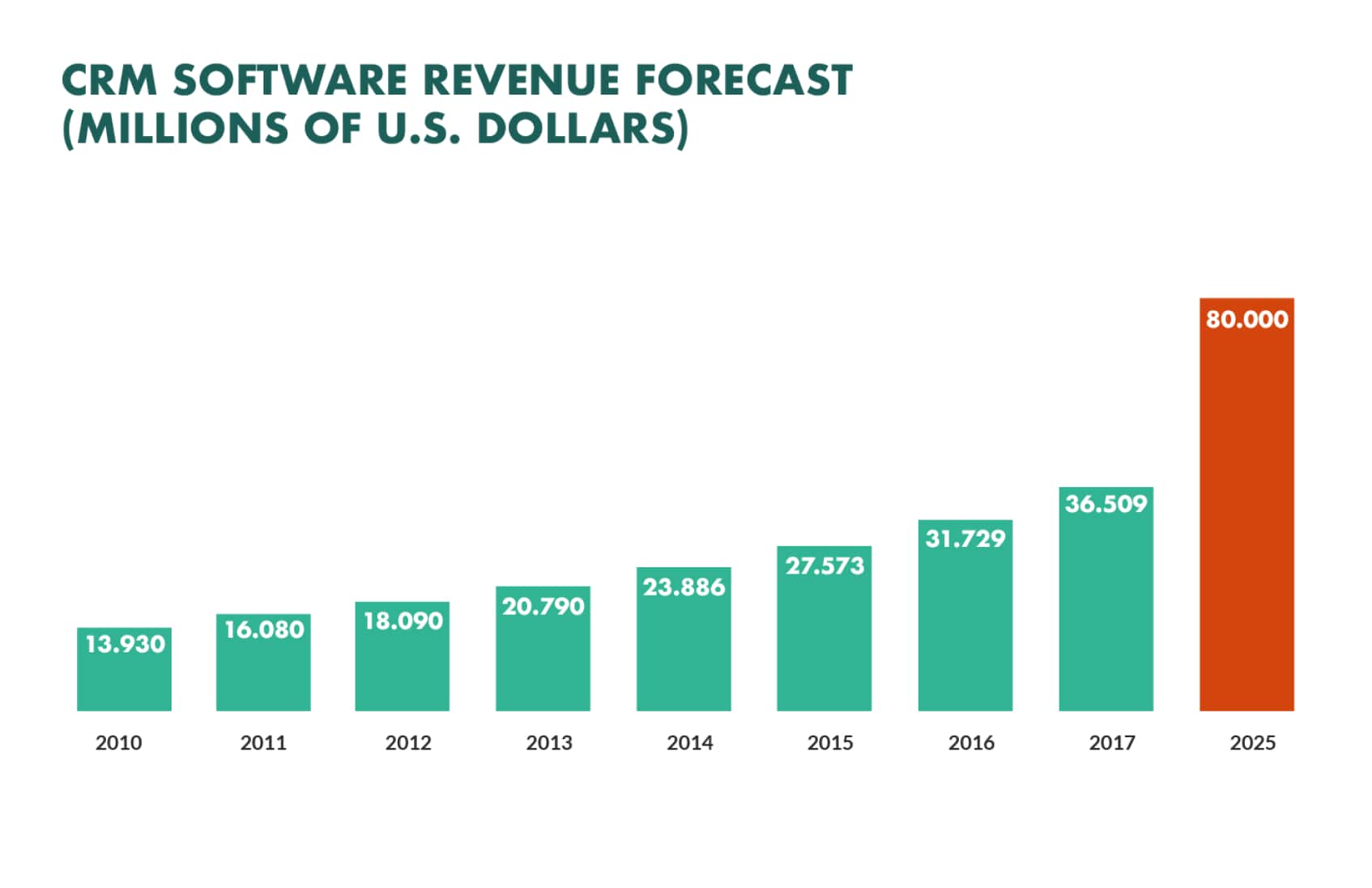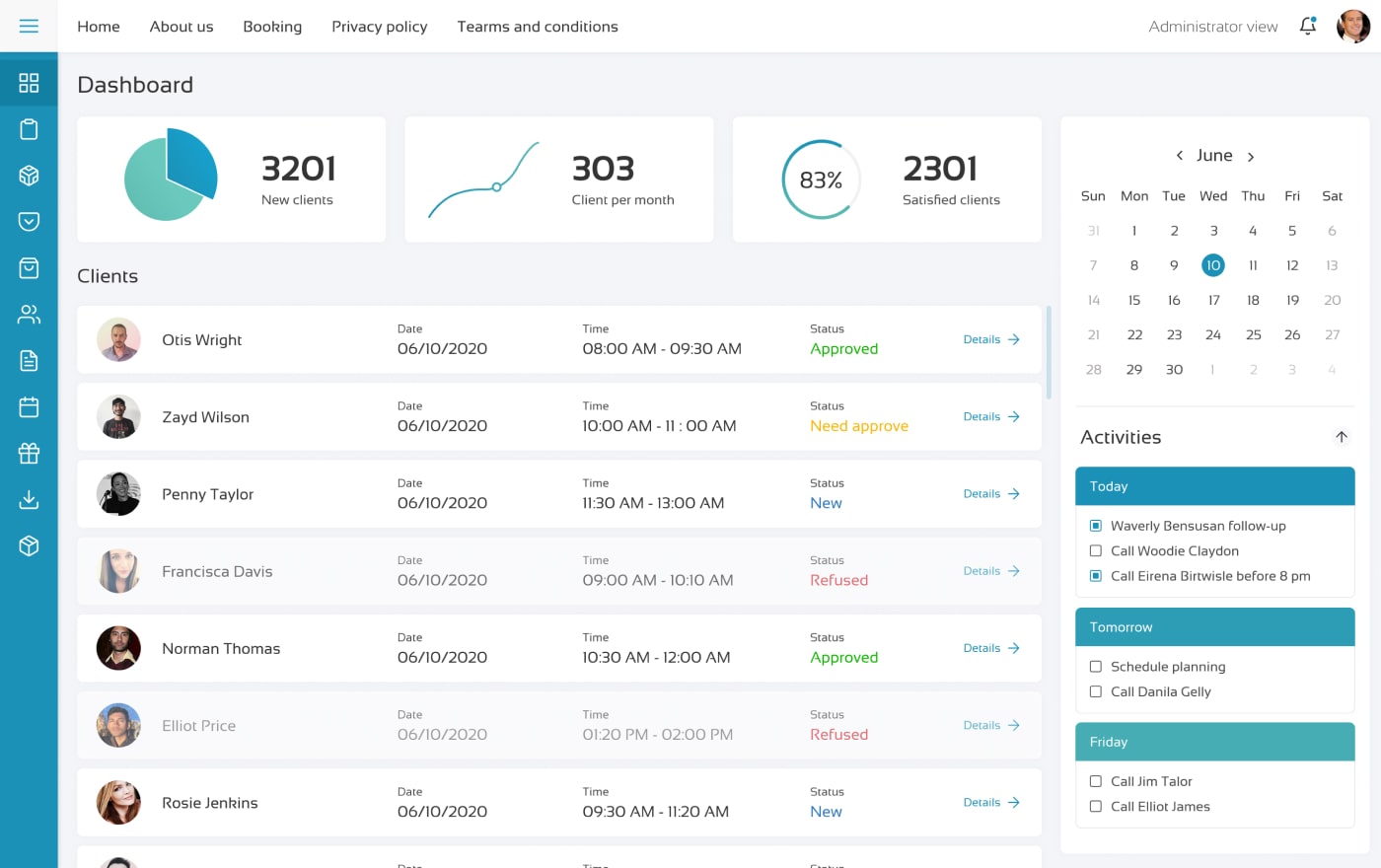Customer Relationship Management (CRM) systems are irreplaceable tools for building long-term relationships with customers. If one of your top priorities is to find new customers and ensure that they’ll return to you again, most probably, you’ve already adopted a CRM system or are planning to do so.
Mainly, companies adopt custom CRM systems if they need to get a clear picture of customer-related processes and expected results. Company managers responsible for this part of the company’s activities can utilize CRMs as a somewhat helpful tool for achieving business objectives.
Therefore, if you’re challenged with bringing together sales, customer support, and marketing activities, the first thing to look out for is whether you are using an outdated CRM system or, for some reason, run your business without it. The question is whether CRM can enhance customer relations for any business or if it’s only suitable for specific industries. This article will consider some examples of using CRM software in five different industries to show you how flexible these systems are.
Why CRM Software Have Become So Popular
First of all, let’s outline some benefits of adopting a custom-made CRM system. During the last decades, these systems have gained a lot of popularity among companies of different sizes worldwide. However, what’s more important is that this growth is not slowing down, and CRM software revenue is expected to reach over $80 billion by 2025:
 The reason is that CRM software adoption is cost-saving in the long run and has enough possibilities to change the process of your work to the best of your ability with minimum efforts. Manually tracking historical customer data for a company operating in the market for many years is a barely completable task. Looking for a specific piece of information for too long and making tons of tiny errors are expected consequences of such an ineffective approach. Clients’ patience and their trust in your brand are not limitless, and, at some point, even the most loyal clients may decide to prefer one of your competitives.
The reason is that CRM software adoption is cost-saving in the long run and has enough possibilities to change the process of your work to the best of your ability with minimum efforts. Manually tracking historical customer data for a company operating in the market for many years is a barely completable task. Looking for a specific piece of information for too long and making tons of tiny errors are expected consequences of such an ineffective approach. Clients’ patience and their trust in your brand are not limitless, and, at some point, even the most loyal clients may decide to prefer one of your competitives.
The use of custom CRM software, on the other hand, allows receiving required customer information in no time. And we’re speaking of something more complex than retrieving customer’s contact information or details of recent orders.
CRM software can help you to know your current and future clients better, for example, by analyzing the user’s actions on your website. For example, you can learn how much time users spend on specific pages, what details about certain goods are of most interest, and what causes the most frustration. With this info, you can make data-driven decisions and better achieve customer satisfaction.
The progress in software development allows the creation of CRM solutions that can satisfy the needs of almost any company. For example, the rise of SaaS systems has opened access to cutting-edge CRM solutions that even small businesses can afford.

Screenshot from SAAS CRM System and Online Appointment Service Case Study
There’s a lot of variance in the ways how CRM software operates in different environments. Each industry has its specifics, and each business owner runs the business differently. As a result, there’s a myriad of various ways to develop an ideal CRM system. To highlight how many possible solutions bespoke CRM system developers can offer to satisfy the needs of their clients, let’s take a look at how five different industries use this software.
Five Industries Where CRM Software Can Become Helpful
1. Healthcare
The 2010 Patient Protection and Affordable Care Act has led to significant changes in the US healthcare sector, at least from the CRM software adoption standpoint. Subsequent widespread digitalization has changed the landscape of the healthcare industry as we know it. This action started a massive subsidy program allowing private medical organizations to adopt cutting-edge software solutions, including CRMs.
Today, in the vast majority of cases, consumers of medical services will face a retail-like service delivery model. When a US citizen contacts a healthcare organization, the CRM system will be used to book a doctor’s appointment, add it to the schedule, notify the patient in advance about the upcoming visit to the doctor, etc. Additionally, the use of collected data can be used by AI-powered software for detecting various patterns, which can be helpful for planning. For example, such systems can predict the upcoming seasonal influx of influenza patients, update staff schedules to be ready for possible consequences, and notify employees about the lack of necessary medicines in the case of need.
2. Retail Industry
Advanced CRM software for the retail industry allows companies selling goods and services to provide their customers with a highly personalized shopping experience. CRM software can analyze data collected through a company’s websites and social media for identifying the needs of a target audience. Applying AI and machine learning, CRM software developers can help businesses increase customer satisfaction by various means, from chatbots to different loyalty programs, including personalized offers based on customers’ preferences.
3.Hotels/Hospitality
The hospitality sector provides guests with different kinds of services in hotels, restaurants, or bars. Among them, hotels are considered as the industry sector that benefits most from adopting CRM software. Such systems enable staff to get quick access to info related to the hotel’s current and future guests in an organized and easy-to-understand way.
CRM systems for hotels can be integrated with the front-desk and reservation modules. Such an approach will free your employees from the necessity to enter data into the system twice. Instead, all the necessary info will be saved automatically, analyzed, sorted, and shared with all departments requiring access to this data. Any employee with the required access level can use the CRM system on PC or mobile devices to receive data related to s specific client, review past and future room reservations, contact info, etc.
Read Also How Custom CRM Software Can Help Your Real Estate Business
4. Financial Services
The financial industry (primarily the banking sector) also widely uses CRM software to understand customers’ behavior better and create more attractive offers. Analyzing customers’ information, CRM systems can help you get more leads as quickly as possible by assisting them to solve their challenges. As a not-so-attractive alternative, CRM software can help you determine that your organization can’t provide the services they’re looking for. Either way, you’ll get the possibility to increase the performance of your sales department by allowing it to focus on converting leads into sales.
CRM systems can help you plan marketing campaigns or develop personalized approaches to build solid relationships with the customers and provide them with solutions to their problems when they need it the most. For better productivity, you can use CRM software as a tool helping to minimize the number of repetitive tasks across different departments. As a result, your staff members will become more focused on the clients’ current needs. The number and type of transactions and the types of credit and debit cards that your customers prefer can become a basis for valuable insights allowing you to improve your services.
5. Manufacturing
First of all, the use of CRM software in manufacturing helps demand forecasting, which can be crucial for high-tech and electronics companies. An integrated CRM module can compare data gathered across different departments of the manufacturing company with historical info related to orders to develop pretty accurate forecasts related to product demand. With this information, companies can deliver products to the market faster and outstrip the competitors.
Defective products are the number one cause of client dissatisfaction for manufacturing companies. An integrated CRM solution can help gather and analyze enterprise-wide data to detect possible process errors in real-time mode. It’s not enough to develop top-class products to gain market success. If your supply chain is inefficient, all your hard work will be wasted. CRM software built according to the specifics of a manufacturing company can provide a clear picture of how the distribution chain operates. It can help you to detect potential weak spots and determine how to move products to market quickly.
Conclusions
In any industry, for any company, there’s always room for improvement. It’s pretty hard to find a business owner who claims that his or her company has reached the limit of its potential, and further improvements will be a waste of time. One of the possible ways of bringing new opportunities is to adopt a custom CRM system enabling new options for reaching customer engagement. Such solutions can benefit businesses and their clients by providing solutions for issues both common for the industry and unique for a specific company. If you think about adopting a custom CRM software which can bring a great value to your business, do not hesitate to contact us, our experts will provide you with a free consultation.